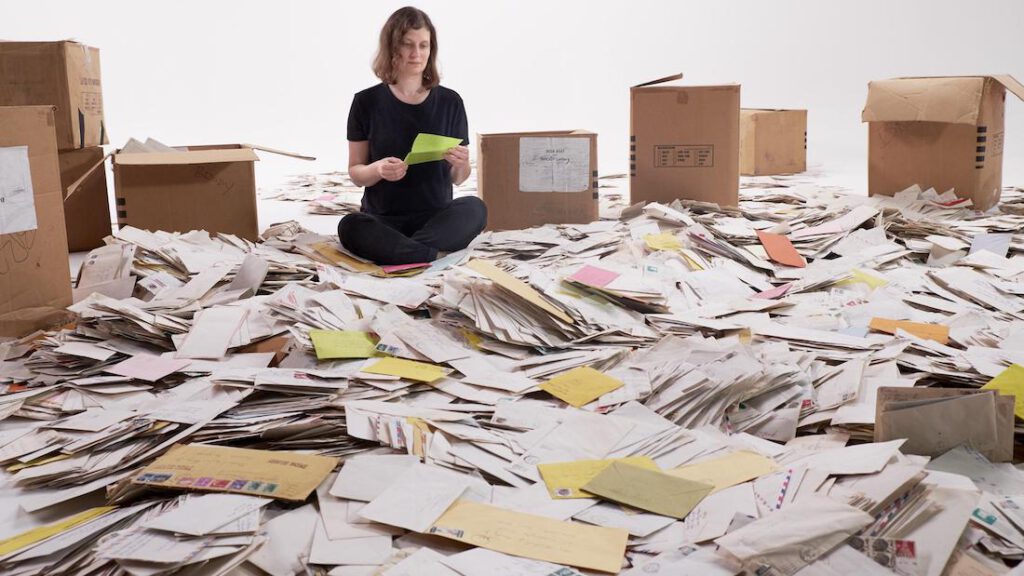“Dear Mr. Brody,” the latest documentary from “Tower” filmmaker Keith Maitland, recollects a saga that is bound to deeply resonate with our modern culture of hospital bill GoFundMes and stimulus packages. It focuses on a bizarre but telling nugget of pop culture history: in 1970, a young hippie millionaire named Michael James Brody Jr. told the media that he would give away his money to those who needed help. He was a messiah, in part because he was so powerful, and that he gave people something to believe in. Director Keith Maitland performs a great balancing act in telling Brody’s story and in honoring the thousands of letters they wrote to him that he never opened. Brody ends up becoming the MacGuffin in this documentary, a mystery box that the film can only collect different speculations on—was he on PCP? Was he a Schizophrenic? The mystery remains a little frustrating throughout the doc, even with his wife Renee and bodyguard offering behind-the-headlines insight on his behaviors during those few days in which Brody’s millions were in the spotlight.
Instead “Dear Mr. Brody” is about the letters, with the film making a reverent point to explicitly say that it wants to “honor” them. It’s very aware of the sadness of these unopened letters, and the desperation within them, multiplied by the thousands. The efforts here to honor them are indeed heroic, starting with having actors monologue bits of them to the camera (with scratchy audio track to nudge period authenticity), or later, to have the actual people who sent them open the letters and read them out loud decades later. As “Dear Mr. Brody” makes a slightly clunky narrative shift to focusing on the people, it becomes incredibly powerful with these different passages that illuminate the needs people had in 1970s, which are often requests for specific sums of money that they will use to help the way they live, or the ones they love. “Dear Mr. Brody” exemplifies how when people are at the point to ask for money, it’s not like everyone wants to buy a sports car. As one person says in the film, Brody’s actions inspired people to think about what was most important to them, and as evidenced by numerous letters referenced, it’s not the entitlement of money. True to the saying: it’s “need, not greed.”
The deficiency of capitalism is an extremely depressing, stadium-sized force that’s always on the horizon of this story; a force that Brody tried to fight with an idea that proved to not be a plan, so much as a commercial for peace and love. Maitland’s documentary, with its energetic visual style, makes the longing within these letters from 1970s as of-the-moment as they can. The intentions of this documentary are gorgeous, and its belief in Americans, past, present, and future is a force to be reckoned with.

Paul Fronczak has lived a full, meaningful life, even if he doesn’t know how old he is. Or, where he was born. His life is a bit of a mystery, and so too are the events in this story about a baby that was stolen from a Chicago hospital in the mid ‘60s, and then found in New Jersey two years later. That stolen baby was Paul, reunited with his parents and then went on to live a life. Or was it not?
Such a story of hard left-turns requires a good narrative balance, and Ursula Macfarlane’s documentary “The Lost Sons” has it for the most part. It’s initially set up so that you aren’t worried about the missing baby, with a reenactment early on shows an eight-year-old finding the headlines about his story. But then “The Lost Sons” starts to catch up with modern times, and shows Paul’s life as a young man adjusting to this type of trauma he doesn’t understand. He becomes a bassist, travels to Las Vegas, becomes a body double for George Clooney—these parts aren’t entirely that interesting and the documentary loses a bit of its momentum. It’s midway through that “The Lost Sons” reveals that Paul did not know everything he thought he knew about his identity, and blasts off into that thrilling unknown of true-crime and investigation that viewers love. After all, who are the people that make its title plural?
“The Lost Sons” follows an investigation in modern time, while balancing with Paul’s unique and vivid life crisis, as he reflects in interviews that are peppered with disbelief, frustration, and understandable obsession. (The film is produced by CNN Films, who previously gave us the similar “Three Identical Strangers.”) We want Paul to find answers, because of the doc’s sharp but natural storytelling, and because of how much we care for Paul. The people who unexpectedly enter into Paul’s story, hoping to help him in a mission that seems impossible, give it a special heart. And they stand out within this saga about families that preferred not to talk about painful things in the past, it has lead to missing people, broken family trees, and disconnection. The surprising connections within the twists of “The Lost Sons” are completely heartening, and its sense of mystery is only the beginning in empathizing with Paul’s incredible story.

Brendan Fitzgerald and Nick August-Perna’s “The Oxy Kingpins” is a mighty persuasive piece of journalism about the opioid epidemic, and the immense culpability that can directly traced to billion-dollar pharmaceutical companies. It sharply refocuses the nation’s problem of opioid addiction beyond drug dealers to include the companies that have gotten people hooked on the heroin-like capsule, and how they target impoverished communities, creating addicts and destroying countless lives. Produced by media company The Young Turks and executive produced by Chris Smith and Adam McKay, it plays out like McKay’s “The Big Short” in particular, displaying the different hierarchies of drug dealers in a national catastrophe, with David vs. Goliath dynamics with a frustrating imbalance of accountability.
After we get a sense of the intoxicating rise and harrowing fall of being an Oxy dealer—along with how easy it is to get Oxy from a “pain clinic” in Florida with no ID needed—the editing focuses on an attorney trying to make a case against big pharma, with narrative presentation considerably dry. And though we’re sitting in on these discussions as a way of understanding the case, it’s too scattered with its editing to negotiate a fly-on-the-wall presentation to such David vs. Goliath justice in action. It all makes the documentary’s large amount of stock footage all the more glaring, as accompanying blockbuster images of yachts, pills being made, and more, have a certain lifelessness.
But in its goal to simultaneously educate and move its audience, “The Oxy Kingpins” is filled with damning information you won’t soon forget. Inside it are different narratives of people who got hooked on the drugs, or sold it; some who speak with their sorrowful faces in full illumination, and others with their personalities obscured by voice alterations and shadows, aware of how destructive the billion-dollar business can be.












